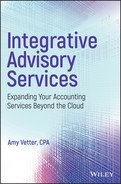Introduction
Since I was 12 years old, I knew I was going to be a certified public accountant (CPA). I grew up with stories about my Grandfather's CPA practice, which he began in the 1930s with the purpose of positively impacting the business owners in his immigrant neighborhood in St Paul, Minnesota. He was what I call the cherished advisor of his day—providing guidance to small business owners on financial decisions that were strategic for their businesses. Their relationships went way beyond figures and numbers.
My mother, as she grew up, decided not to become an accountant and instead was drawn toward the arts. However, her natural business acumen ended up coming out later when she opened her own maid service operation when I was young. I was involved right from the beginning. After school, I often worked the front desk and did various administrative tasks. I learned early on about the importance of knowing your numbers as a business owner because, unfortunately, my mom was not an accountant, and she found herself making decisions that ended up being detrimental to her business in the long run.
Like many small business owners at the time, my mom didn't have an accountant who was an advisor. Instead, due to limitations of technology, she received strictly compliance financials, and many times six to nine months after the financial year was over. She had no insight into the numbers, nor an accountant who could explain her performance, so she was left to make financial decisions without any guidance.
When my mom took me to trade shows and conferences for her business, I would ask other business owners what major I should choose when entering college. The answer was unanimous: accounting. They told me that no matter what career I eventually chose, having an accounting background would help me make better decisions in business.
In hindsight, I wonder about the root cause of this statement. Is it necessary for everyone to have an accounting degree to run a business? The answer should be no, because if you have an accountant involved with a business who provides insight and advice, the business owner should be able to stay focused on what they are good at, leaving the financial analysis to the experts. But my guess was that these business owners were not getting the advice and involvement from their accountants they needed.
Fast forward to today. We have finally reached a pinnacle moment in the accounting industry in which cloud technology, as well as the onset of artificial intelligence and machine learning, has greatly reduced the time and effort needed for traditional data entry and number crunching.
Technology provides us the opportunity to take our practices in a new and rewarding direction. We can now restructure our firms to offer services to clients that they have wanted for years. There are no more excuses as to why we can't offer these services—only ourselves and not taking the time to restructure our practices. Our clients are adopting the most up-to-date technology on a regular basis. In turn, as accounting professionals, we need to keep up with their needs and be familiar with how they conduct their business and interact with customers.
This new direction for accounting is not a trend. It is the future. The rapid pace of change is one we have never seen before in our industry. Now is the time to make an investment not only in your professional future, but also that of your business.
I have worked with accounting practices and small businesses for more than 20 years as an accountant, advisor, and consultant—offering advice and guidance on how to make these changes in an organized and effective fashion. I have gathered all my experience and interactions over the years into this book to create a comprehensive plan that guides you through building an integrative advisory service for your practice.
The approach goes beyond the latest technology. It's about creating the soft skills needed to market, sell, and deliver your advisory services. It's about how to create the necessary change management and quality control procedures needed internally to ensure you offer only the best service to your clients. It's about learning the skills to guide conversations with a client that go beyond the accounting, to give them the advice they need to maintain positive cash flow, to prevent them from making bad purchasing decisions, or to find innovative ways to create more efficient overhead to generate more profitability.
By becoming a cherished advisor, you will learn how to create an experience for your clients that they have not had before with other accountants or bookkeepers. You become an integral part of the real-time decision-making process; services are delivered proactively, rather than reactively; and you understand both the operational and financial sides of the business. As a result, you become a strategic partner that the business appreciates, highly values, and cherishes.
This book provides the steps you need for this journey into the next phase of accounting. Rather than worrying about whether your job will one day be replaced, be proactive and learn how to retool your skills to be ahead of the pack. The culmination will be that you can integrate these advisory services into your practice, expand your services beyond cloud technology, and be cherished by your clients.
